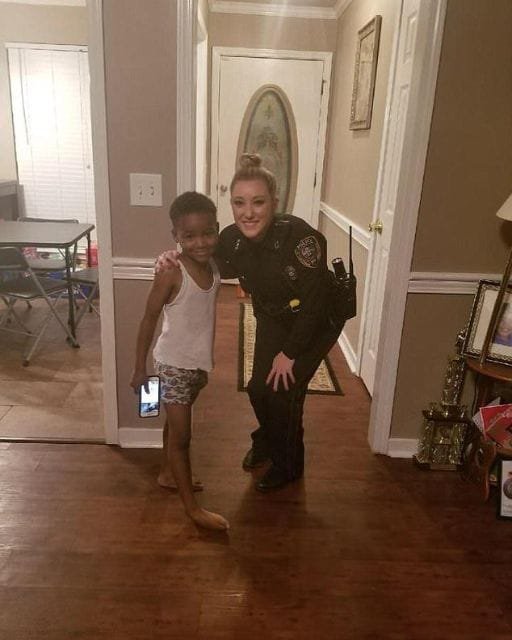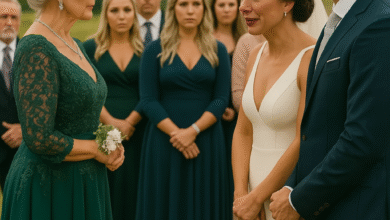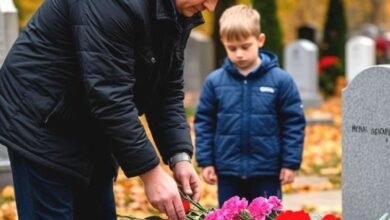He Called 911 Because He Was Hungry — And Then She Appeared.

It was around 9:30 p.m., and I had just finished putting my youngest to bed when the call came in. Dispatch said a child had dialed 911 but didn’t speak. The call had been traced to a modest home in my patrol area, so I headed over to check things out.
I knocked on the door, and a little boy—barefoot and wearing pajama shorts—opened it. He held the phone like it was the most important thing he owned. He looked anxious but determined.

He told me he was hungry. That he hadn’t eaten all day. There were no adults at home—just him and his little sister, who was sleeping in the back room.
My heart sank.
I asked about his mom or dad, but he just looked down and shrugged. The place was clean but empty. No food on the counters. The fridge was nearly bare—just a few ketchup packets and an old jug of milk.
I knelt down and asked if I could take a picture with him—not to show anyone, but to remember. He smiled wide for the first time.
Then I called for backup—not to arrest anyone, but to bring food. I didn’t know exactly what I was walking into, but I knew I wasn’t leaving them like that.
That night turned into something I never expected.
While waiting for help, I spoke more with the boy. His name was Mateo, and he was eight years old. His little sister, Sofia, was five and fast asleep. Mateo told me their mom worked two jobs and sometimes didn’t get home until very late—or at all. She had left early that morning for her diner shift and hadn’t returned.
Mateo seemed older than his age, far too used to this kind of situation. He said that when his mom couldn’t be there, he always made sure Sofia ate before going to sleep. But tonight, everything was gone. Even the peanut butter jar was empty.
Soon, an ambulance arrived. The sirens echoed through the stillness of the neighborhood. One of the paramedics, a woman named Rosa, had already heard about the call. She brought with her a brown paper bag filled with granola bars, sandwiches, and juice—emergency supplies she always carried.
Rosa stepped in with calm energy and immediately put Mateo at ease. “You must be starving,” she said gently, handing him a foil-wrapped sandwich. He nodded shyly but didn’t eat right away. Instead, he set it down and looked toward the hallway where his sister slept.
“I should wake her up,” he whispered.
“No need,” Rosa said softly, placing another sandwich next to his. “She can eat when she wakes up. You go ahead.”
For the first time, Mateo hesitated. Then he carefully unwrapped the sandwich and took a bite. His whole face relaxed, like he’d been holding in tension all day. Watching him eat reminded me just how easy it is to take food for granted when you’ve always had it.
Rosa and I shared a look as Mateo ate. We both knew we couldn’t leave these kids again. Not tonight. Not until we understood the full story.
“I’ll stay with them until social services arrives,” Rosa said quietly. “You should go find their mother.”
Her words struck me. Of course, finding the mother was important, but something made me hesitate. Maybe it was the way Mateo clutched that sandwich like it might disappear. Or the fear in his eyes when I mentioned someone else stepping in.
So I said, “Let me try reaching her first. If she doesn’t respond, we’ll figure out the next steps.”
That gave Mateo hope. He paused his chewing and said, “She works at Joe’s Diner. But she’s not allowed to use her phone while working.”
That detail changed everything. Maybe she was just stuck at work, unaware. I radioed for someone to check Joe’s Diner.
Twenty minutes later, dispatch confirmed a woman matching the mother’s description was there—and panicked. She had realized hours earlier that she’d left her phone at home and couldn’t contact her kids. She cried with relief when told they were safe and begged to speak to them.
The moment Mateo heard her voice, his entire demeanor changed. He lit up like a Christmas tree, telling her excitedly how Rosa brought food and that everything was okay now. His love for her was obvious—as was his fear that something might have happened.
By the time the mother arrived home, social services had already been contacted. But considering the situation, they chose not to take any further action. They simply reminded her about local resources for families in need. Before leaving, Rosa handed her a flyer with information on free meal programs and community support services.
That night, as I drove home, I felt thankful that things had ended better than I expected. But even after I walked through my front door, I couldn’t stop thinking about Mateo holding that sandwich. It made me realize how fragile life is for families living paycheck to paycheck—and how powerful a little kindness can be.
Two weeks later, guess who showed up at the station? Rosa. This time, she wasn’t in uniform—just jeans and a bright yellow sweater. She thanked me for letting her come along that night and brought a box of homemade cookies.
“You know,” she said thoughtfully, “those kids are still on my mind. So I decided to do something about it.”
Rosa had gathered a team of firefighters, nurses, and paramedics to create a volunteer program called Midnight Meals. Every Friday night, volunteers delivered care packages—full of snacks, toiletries, and handwritten notes—to families identified by local schools as needing support.
What surprised me most was how many people wanted to get involved. Teachers donated books. Grocery store owners gave canned goods. Teenagers volunteered their time to help sort and pack. Within just a few months, Midnight Meals had grown far beyond what we imagined.
One cold December night, Rosa invited me to join a delivery route. I braced myself for emotion as we approached Mateo and Sofia’s house. Would they remember me? Would they feel embarrassed?
But I was relieved when Mateo greeted us warmly and recognized Rosa right away. This time, he wasn’t barefoot or hungry. His mother stood beside him, smiling proudly. She welcomed us in, thanked us for what we did that night—and for continuing to show up.
The home looked brighter inside. Decorations from a local church were taped to the walls. A small artificial tree stood in the corner, decorated with donated ornaments. And the kitchen table held a care package from Midnight Meals—bread, fruit, and essentials.
As Mateo laughed and showed Rosa his latest school project, I felt something shift in me. I realized that small acts of kindness can ripple outward in ways we never expect. What started as a routine welfare check had become a movement built on empathy and community.
Before we left, Rosa handed Mateo a brand-new backpack full of school supplies. His eyes filled with tears as he hugged her tightly.
“Thank you,” he whispered. “For everything.”
On the drive home, Rosa and I talked about how nights like this remind us why we chose this path. Yes, the work can be hard. Even heartbreaking. But moments like Mateo’s smile—that’s what keeps us going.
Here’s the truth: everyone faces struggles. None of them are too small. Your actions—whether feeding someone, offering help, or just listening—matter more than you think. You never know whose world you’re changing with one simple gesture.
If this story moved you, please share it. Let’s spread kindness wherever we go. Together, we can create ripples that turn into waves. ❤️





